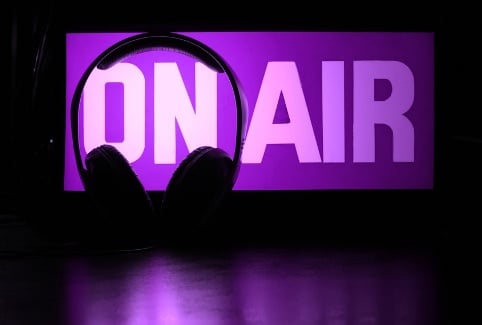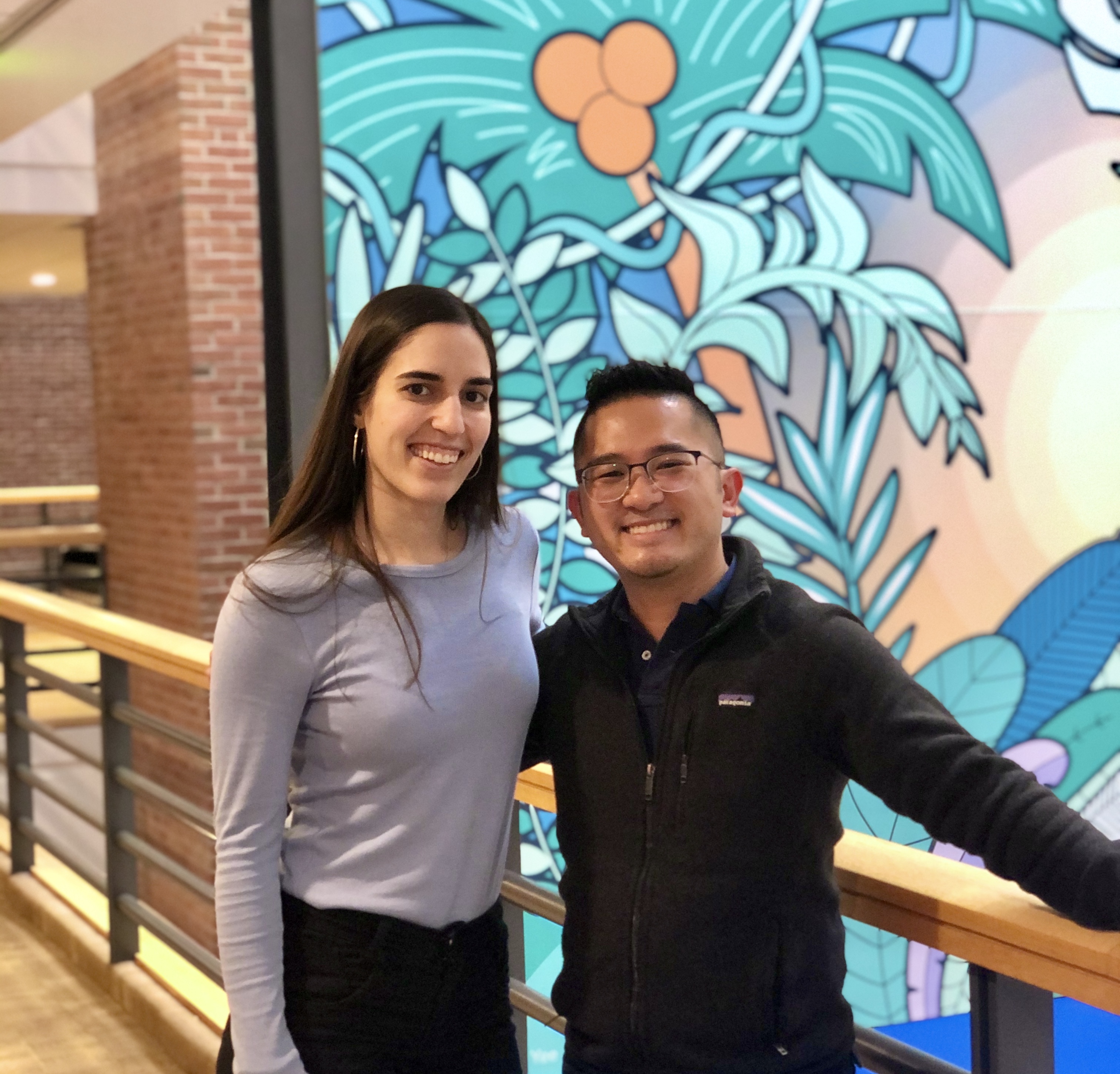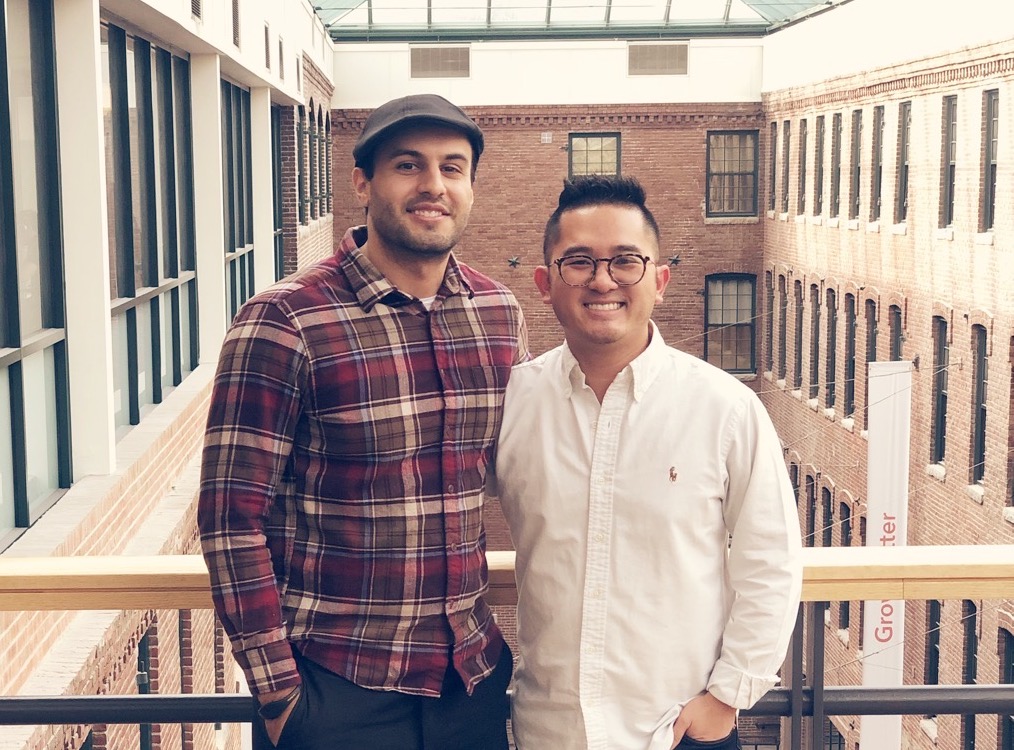About the Series
In our Campus to Career series, I sit down and chat with remarkable people about how they started and grew their career.
.png?width=1280&name=Careers%20Blog%20-%20Campus%20to%20Career%20logo%20(1).png)
What was going through the mind of their college self? What prepared them for a job? What worked (or didn’t work) for them in their career search? What would they have done differently? What is their career today and what do they love about it?
Every episode is an opportunity to uncover these questions and more, and our goal is to provide some advice and inspiration to spark your career path.
Transcript
VC: We're here with Chris Pappey here on Campus to Career. Chris, thanks so much for joining us on the show!
Happy to have you. And I know we're practicing social distancing really to a T because we are not in a studio [like we originally planned]. We are on Zoom from our respective homes. How's remote life going for you?
CP: It's going well. It's a bit of an adjustment, but it's going well so far. HubSpot's been very well set up for a remote environment, so not too much different from business as usual, but obviously, working from home every day does present its fair share of challenges and everything like that.
VC: Yes, I feel that, especially for me, my biggest challenge right now is figuring out how to work out, especially at home since I'm not used to doing that.
CP: And doing podcasts over Zoom now!
VC: Yes, this is definitely the new normal now.
But yes, super excited that you're on the show because I'm very interested to learn about your role. You're in a special team at HubSpot and so I'm excited to uncover how you got here, how your college experience really played into this too. And also your general career advice with our listeners.
And a fun fact that we didn't discover until we got here was that we went to the same school, but didn't know each other at the time since we went at completely different times.
So, I feel like this is the alumni community coming together in a really special time right now. So, why don't we jump in? Let's start with what's your current role at HubSpot? What's the team that you're on? And when did you start with us?
CP: Yeah, so, I'm an associate customer operations analyst on our Customer Success Strategy and Operations team. So it's quite a mouthful.
And I started in June of 2019, right after I graduated in May from Holy Cross.
VC: Very cool. So you're about to approach your one year mark in about three months, which is exciting. Remind us again [in case someone missed it], where did you go to school?
CP: Holy Cross.
 VC: Yes! Holy Cross, go Saders! I graduated from there in 2011 so I'm really sad I didn't get to know you when we were there together. But I feel like HubSpot brought us together for a special reason and that was this [show].
VC: Yes! Holy Cross, go Saders! I graduated from there in 2011 so I'm really sad I didn't get to know you when we were there together. But I feel like HubSpot brought us together for a special reason and that was this [show].
CP: Exactly. I feel like there's a lot of Crusaders at HubSpot. There's a fair amount.
VC: Yeah, there are definitely about, at least, 30 that I know of, so there are more than I thought. If there are more of you [Holy Cross alums at HubSpot] out there listening, join our Slack channel! We want to know who you are because obviously we're a special community.
When you were at Holy Cross, I was just curious, what was your major? Because we went to a liberal arts school and so, a lot of times, analytics is not a major that was offered for us.
CP: I was an economics major.
VC: Great - and we also talked about, before we got on the chat here, how clubs got into your journey too and how that really informed a lot of your experience.
There were also some internships that were on your plate too that also helped out.
So, before we get into that, I was just so curious about how did wanting to work in analytics or an analyst role just come to mind because when you go from a liberal school to analytics, that's not always like the first thing comes to mind.
 CP: No, that's a great question. I think, when I was debating towards the end of senior year what I wanted to apply to, I wanted to learn tangible skills that could, no matter where my career takes me in the long run, I can apply.
CP: No, that's a great question. I think, when I was debating towards the end of senior year what I wanted to apply to, I wanted to learn tangible skills that could, no matter where my career takes me in the long run, I can apply.
So I know that in analytics, you know, having gone through my first year, I'm now able to pull, clean, and analyze data, and then present that to stakeholders and communicate it effectively. My thought process when I was applying was if one year out, I've made a lot of progress in that, I'll call it a success.
I've definitely made progress and learned those skills. And I think they are very valuable skills to have, honestly, no matter you know, where your career takes you.
VC: And I know I spoiled how you arrived at this through clubs and internships. So can you walk us through what were some of the clubs and those internships that got you thinking about this path in the first place too?
CP: Definitely. So coming from high school, I didn't really know much about analytics as I don't really think many high schoolers do honestly. And throughout my entire time in college, I didn't really know much about analytics. But I thought I came into college thinking that I wanted to go the financial route.
So, after freshman year, I had an accounting internship at just a very small family run business in a suburban town in Boston. But that was good just because it got me exposed to the corporate environment.
 Then I was able to translate that into a full-time finance internship during my sophomore year, and then I did the same internship my junior year. In those two internships, it was a financial internship, but it was similar to what I'm doing now in the sense that each intern was presented basically with a problem within the organization and you basically had to find the correct data, pull it, clean it, analyze it, and then present a finding or solution to stakeholders.
Then I was able to translate that into a full-time finance internship during my sophomore year, and then I did the same internship my junior year. In those two internships, it was a financial internship, but it was similar to what I'm doing now in the sense that each intern was presented basically with a problem within the organization and you basically had to find the correct data, pull it, clean it, analyze it, and then present a finding or solution to stakeholders.
That's honestly a lot of what I do in my day-to-day today. And I was able to use my experience in order to show that I basically had a lot of experience to talk about in my analytics interviews for full time positions after college. So, those internships were extremely helpful to me in terms of starting my career in analytics.
VC: That's awesome. And being at Holy Cross, there's a whole plethora of clubs you can do too. But I don't remember there being a specific club for things like this area.
When you did clubs at Holy Cross, were there certain ones that you gravitated towards to help you grow this interest further, or did you have other clubs that helped you lean on other things?
CP: Yeah, so I chose my clubs based off of mostly two things: 1) what I was most interested in and 2) I wanted to join clubs that would help me basically work on my weak spots.
For instance, I was a tour guide during my senior year just to work on my public speaking, and that actually helped a lot. I still think this is an area where I can grow, but I feel like I'm a lot better than I was senior year or junior year of college.
I also joined a radio show, as corny as that sounds, to try and work on my public speaking skills. But at the same time, it was something where I was playing music that me and my roommate both liked and at the same time, just like talking about random things.

VC: I can hear your radio voice come out very perfectly over this, so I think this was a match made in heaven to have you on the show today. The thing that you honed in on a lot is picking clubs based on your interests, but also to help you strengthen certain skills.
I think that's something that's valuable no matter what career path you go into. So you mentioned that helped you with public speaking. What else did it help you with in terms of the skills that you felt like you were weak at?
CP: I don't think I was ever a really good interviewer, but I became a senior interviewer in college. So if you wanted to attend Holy Cross, you had to pass through me first.
But I mean, selfishly, I mean, I loved working in admissions and having opportunity to contribute to the college, but I liked it too because I was able to become a better interviewer after that as well. It was, one, a chance to be able to give back to Holy Cross a little bit, and at the same time, honestly take something from it like a tangible skill where now I know I can use what I liked from the students who interviewed.
Because the 17 year olds who are interviewing now are way more accomplished than when we were interviewing. They're doing so many things that I just cannot believe, but I was able to use a lot of things I liked that they did and use it to my advantage where I ended up applying for full time positions after graduation.
VC: That's cool. I like that you, you definitely balanced the practicality of going into student clubs to develop yourself, but also just like doing things that were just fun.
Like, I wish I heard your radio show like back then because you can listen to a Holy Cross' radio station from here, so I wish I knew that back then. But I'm sure I could find some old archives around that.
So then, you graduated in May 2019. Did you start your career search right after you graduated or did you start your job search before?
CP: Before graduation, in the spring. And then I knew that I was hired, I think it was, a week after graduation. So basically right after.
VC: One thing I want to flag here is that it is definitely doable to wait until the spring of your senior year to get a job. So you heard it here.
Let's actually talk about that for a second because we're in the spring right now where many students who are just two months away from graduation are probably still freaking out that they haven't gotten a job. So what's your take on that? Should students be afraid right now or do you think it's going to be okay? I have my take on it.
If anyone has listened to any of my opinions about this before, you probably know my answer to this, but what's your take on it?
CP: Yeah, definitely don't be afraid. It always works out.
And I would just say leverage your network, whether it's your alumni network, whether it's people that you know, just talk to people. Not even just like, "Hey, can you give me a job?" It's more just like, "I want to know what you're doing because I'm genuinely interested in."
I think if you go about it that way, everyone's so happy to talk to you. The Holy Cross alumni network is awesome, for example, so I definitely leveraged that when I was applying to positions. If you reach out to people and talk, the worst thing that's going to happen is, you're going to have a good conversation with someone and maybe learn something from it so that's probably my biggest piece of advice.
VC: Nice. So let's unpack that for a second.
Because the art of a LinkedIn referral is definitely an art. It's not something that is easy to do. There are definitely some non-ideal ways to go about it, but then there's the perfect way to go around it that you happened to achieve to get to your current role now.
I wanted to just explore that for a second because you mentioned the alumni network was a key component to finding your role at HubSpot. So what was that experience like? Can you walk us through like the events that you went through to reach out to someone on LinkedIn and how that came about?
CP: Definitely. I first heard about HubSpot from my sister who just heard it was a really great company. She works in Boston. I feel like young professionals in Boston, they know about HubSpot just because of the type of reputation that we have.
She mentioned it and then I started reading online. I saw the Culture Code, started reading some of the HubSpot blogs, and I was like, "this seems like a really cool place to work."
I did a little digging, found some positions that I think I was qualified for, and then I reached out to people [from Holy Cross] on LinkedIn. The strategy that I used was I looked up "HubSpot" and then I filtered on "Holy Cross" because in the Holy Cross alumni network, everyone's super, super helpful to talk to and super willing as well.
I reached out to a couple folks, one of whom took 30 minutes to talk with me. And then by the end of the conversation, we talked about what I was interested in, basically a lot of what you and I talked about: student clubs, why analytics.
Then he sent my resume out to a couple of teams and one of the teams that he sent my resume to is the team that ended up hiring me; they brought me in for an interview.
Overall, I think leveraging the network is huge, especially because having that personal interaction with someone where they can really get to know what you're interested in and what you're not interested in is just so helpful. Especially if they're able to send your resume to someone, it's just that much easier.
VC: Right. And there's also definitely an art about how you should frame that first message because it can really make or break if someone responds to you or not. I mean, granted, it's an alumni network; our community is pretty cool and they'll reach out to you no matter what.
But I think putting a lot of thought and effort into crafting your message, and even the work before crafting that message still really plays a role here. So, do you remember what your message to this HubSpotter sounded like?
 CP: I wanted to show first that I did research, why I wanted to come to HubSpot, and the positions that I thought I was qualified for.
CP: I wanted to show first that I did research, why I wanted to come to HubSpot, and the positions that I thought I was qualified for.
But at the same time I didn't say, "oh, I want you to get me a job." I framed it in a sense of "I want to learn more about these roles." Because that's true.
I didn't necessarily want to apply to these jobs without knowing about them. I wanted to learn more about them and see if I, first, was qualified and, second, if I would be interested in them.
By the end of our conversation, I listed three positions in my initial message that I didn't even end up applying for it because I either a) didn't end up being super interested in them or b) just wasn't qualified for them.
So, he sent my resume to teams where it best fit my qualifications and it made it that much easier. I think just do your research and show that you've done your research because that makes everyone's lives a lot easier and show what you're interested in it as well because at the end of the day, the most important thing about finding a job is learning what are you interested in.
And especially in your first year out, what do you want your first experience in the workforce to be like? I would say those are the two main things I would recommend in crafting a message to try and reach out and get that initial conversation with someone.
VC: That's great. And that research you mentioned that you showed interest in one particular area - as a recruiter sometimes, I see a lot of messages that come into my LinkedIn box that either say, "Hey, are you hiring?" Or "hey, do you have any jobs?" Or "hey, I'm interested in this field and this field" that are two almost opposing, different fields.
So for you, what was something that worked for you in terms of how you put forth your interests? Did you have multiple areas that you went to this HubSpotter about or did you have just one focused one?
CP: I definitely had one focused one because I had, at that point, narrowed down that analytics was the route that I wanted to go into.
The three positions that I listed out were all in analytics at HubSpot, which I think made the conversation a lot easier because he knew what I was interested in and it made jumping into that conversation just much smoother, if that makes sense.
VC: Yes, it definitely does.
Because usually here's the thing [if I'm being transparent] - when students say "I'm interested in sales or marketing," that's great. And I think someone should have multiple interests, for sure.
But as a recruiter, sometimes it can be challenging for me to find an opportunity since, for example, sales is definitely different than marketing. And a lot of times, recruiters are only maybe responsible for one area, but not multiple like me.
So, in a way, it slows down the process when you approach a recruiter with multiple interests. Have one that you're really interested in pursuing at that company in particular, and I think that'll take you very far and it clearly has for you because you wouldn't be here if you didn't do that. So first off, congratulations! And I know you're about to be celebrating your one year in a few months too.
Overall, I think that's definitely a great example of how to use a LinkedIn outreach effectively to help you find an opportunity that is essentially where you want to go in terms of your career path. That's great that that HubSpotter was helpful for you and especially since he was an alum. If you haven't leveraged your alumni network out there, listeners, you definitely should!
CP: I also, I want to say, it doesn't even need to be your own school's alumni either. A student from a school in the area reached out to me a couple of weeks ago, and I was more than happy to talk to this person just because [I wanted to] just pay it forward.

I feel like especially HubSpotters are also just super, super willing to talk to people too. So, it doesn't even need to be your alumni network. You don't even need to have a connection with that person either. At least for me.
VC: Yeah. I think that's the empathy in HEART that's coming out. We thank you for being empathetic and helpful to your core so we love that!
Now that we've talked about the LinkedIn referral and how you can effectively optimize your referrals there, I'd love to now just talk about like any general advice here because obviously we're now in this time where everything is going to be done online. So you might have to connect with people on LinkedIn. You might have to just interview virtually. And so this is definitely gonna be new for a lot of us looking for jobs.
Right now, especially if you're about to graduate and are now leaning into the internet more and more - if you were to narrow it down to your top tips, what would they be?
CP: First, I would say if you're a senior or just in general looking for a job right now, just don't lose hope because companies are still hiring, especially HubSpot. We're still hiring right now. It's not, like, things are just stopping.
So I think first, it's important to like keep putting yourself out there because that's obviously step one is to be confident that there are opportunities out there even when the economy isn't doing as good as it was in the past. Second, I would be cognizant of the jobs that you're trying to apply to.
For instance, I wanted to accomplish three things in my first year in school. I wanted to pull, clean, analyze data; communicate effectively, and just learn that tangible skill. Obviously, it doesn't need to be exactly that, but just in the jobs that you're applying to, think through - if you were a year out, what are the skills that I want to have in this role?
I think that just makes it a lot easier because like we were saying earlier, marketing sounds interesting, sales sounds interesting, finance sounds interesting. But out of those, just choose the route that you think will get you the skills that you want in one year or six months or a two year timeframe if that makes sense.
VC: Yeah, it definitely make sense. I don't know if you were a victim of this in college, but I tried to do probably four things in four different opposing areas all at the same time, thinking I would get great at all four. I learned that the hard way though that I needed to really focus on the one thing that I wanted to do most and just roll with that because then I would do better being focused on one thing at a time versus like doing all four at the same time.
CP: Totally. I was the same exact way.
It also can be difficult too just because so many people don't know what they want to do. I'm still in that same boat. I don't know where I'll be 10 years down the road. I don't know where my career is going to take me in that timeframe. But just doing something that you've thought through and that you think will give you tangible results is obviously just the best bet.
Luckily I've found a year out that I love what I'm doing, and it brings me a lot of energy. But I feel like a lot of people don't know that right when they come out of school because I certainly didn't. Having that mechanism to think through what are the skills and what do I think will bring me the most energy every day to work is, I think, super helpful when you're looking for your first job.
VC: I mean, that's great. That's definitely a conversation someone should have very early on, not just like your senior year.
I wish that was something I did much earlier than that. But again, I was young, I was wanting to have fun and I was just focused on surviving through college. So you know, you live and you learn, but you're right. As people are coming to college more accomplished than we did, I think this is a great time to think early and to not be afraid to learn new things and to jump into opportunities that we might not expect.
I want to put one more question on you, putting you on the hot seat. Now that we're in this new normal of being remote all the time and being virtual with things related to interviewing and job searching - I wanted to get your tip for someone like a student or a new grad who was about to jump into a whole virtual interview process, what do you think would be some things that can help ease some of those jitters you would have about talking to someone on a screen [and not in-person]?
CP: It brings a couple of disadvantages, but it also I think brings a couple advantages.
First, I don't want to say you don't need to look the person in the eye, but it's just like you don't need to be in the same room as them, which can make it sometimes easier.
Not being in the same room as someone, at least for me, sometimes calms my anxiety a little bit because when you go to a new place, you're waiting in the waiting room or lobby or whatever it is, I would get so nervous before interviews.
Being in your own space, whether it's your bedroom or your kitchen table can provide some advantages because you can make it your own, make it your home, you can ease your anxiety and just make your interview a lot better. Because when you're calm, you're obviously going to perform a lot better than you were if you were super nervous.
 Another thing - I think this goes without saying - is treat it like you would any other interview. Wear the same thing you would to any other interview. Prepare the same way you would for any other interview.
Another thing - I think this goes without saying - is treat it like you would any other interview. Wear the same thing you would to any other interview. Prepare the same way you would for any other interview.
And I would also say that if you are just having a 30 minute chat with someone, I think it's beneficial to prepare for that like an interview because it's a lot of the same questions. Why do you want this role? Why do you want this company? Just talk through that, don't just think about it. I would literally say it out loud, explaining myself and I would catch myself jumbling my words so that was very helpful for me [to go through that motion] as well.
VC: I was going to say, you're right, you have much more control in this situation, because you can set your setting, you can control what's happening around you. Whereas like in the lobby, you don't really know what's going to happen.
The same goes for when the interview experience starts; you don't know where you're going to be going and it just adds more anxiety.
But being at home, there's more about level of comfort in a way because you're in your own physical space that is calming to you. I love that tip and I also love that you honed in on just treating this experience like a normal interview experience because this truly is still an interview experience. It's still getting to know another person and them getting to know you so remembering that piece is still normal, I think it's also really helpful too.
CP: Yeah. And of course, don't get discouraged because companies like HubSpot are still hiring. So everything's good!
VC: That's true! It's all going work out.
I know we're in this time where we're unsure about how long our remote life is going to last all around the world. But again, I love that there are some pieces we can control and we have technology nowadays to help us continue connecting at least remotely for now.
For me, that's really all the questions I got for you, Chris, in terms of just learning about your journey. I know we talked about a lot in just a short time. So glad we could do this on zoom and that we had the time to really learn about you and share some helpful advice for those who are in the shoes that you were in a year ago.
Thanks again and I hope remote life treats you well over the next couple of weeks, hopefully shorter than that, maybe? Fingers crossed.
CP: Thank you for having me, and I'll see you when we're back in the office!
-25.png)

-2.jpg)







